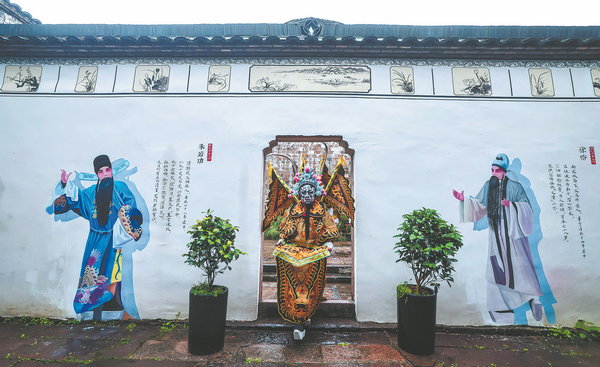
 0 Comment(s)
0 Comment(s) Print
Print E-mail Xinhua, July 4, 2024
E-mail Xinhua, July 4, 2024

Jiang Shaofang, a Wu Opera actor, prepares to go onstage in Zhengdian village, Jinhua city, Zhejiang province, late last month. [Xu Yu/Xinhua]
With its combination of music, dance and drama, a Wu Opera staged by a troupe from Zhejiang province was greeted with enthusiasm by audiences in the Spanish capital of Madrid over the weekend.
Some 2,000 people attended two packed performances presented by the Zhejiang Wu Opera Research Center on Friday and Saturday. Audience members praised the versatility, drama, agile movements, colorful spectacle and poetry of the regional operatic genre, which has been performed for about 500 years.
"I found it very interesting — the combination of music was so unfamiliar, the acrobatics, the gestures and the movements. I thought it was very colorful and unique," Patricia Garcia, a music teacher, said after watching the show on Saturday.
She says the audience was passionate and involved from the beginning. "I think it was a very attractive and different show. It transported me to China," she adds.
During the show, which lasted for an hour and a half, the audience was introduced to different examples of Wu Opera, such as the 9-Piece Segmented Dragon, the suona (a double-reed wind instrument) solo, Picking Dates, and satirical pieces such as The Sedan Ride and Three Triumphs Over the Skeletal Demon.
Amaya Niz Azpiroz, a supervisor at Lufthansa Airlines, says she is very interested in Chinese culture and art, and this was her first time attending a Wu Opera performance.
"I loved it because of its color, how simple it was to understand what was going on, the gestures and expressiveness," she says, adding that she hoped to attend more shows in the future.
Concepcion Gutierrez, a retired professional, says that she was particularly impressed by the dragon. "The girl handing out the flowers (was) so delicate. And then of course, there was the general agility of the performers and the colors," she says.
Some members of the audience, like Rebeca Mato, had come from far away. She has been a cellist for 33 years with the Mexico National Autonomous University Philharmonic Orchestra and was on holiday in Spain when the performance took place.
Mato says that the musical register of Wu Opera is different to Western equivalents, and the performance produced different emotions and the performers demonstrated incredible coordination. "They did lots of acrobatics, they danced ... they are well-rounded artists."
Wu Opera, also known as Jinhuaxi, is the second major regional operatic genre in Zhejiang province. It first rose to popularity in and around Jinhua and was named after Wuzhou, the name for modern-day Jinhua at the time.